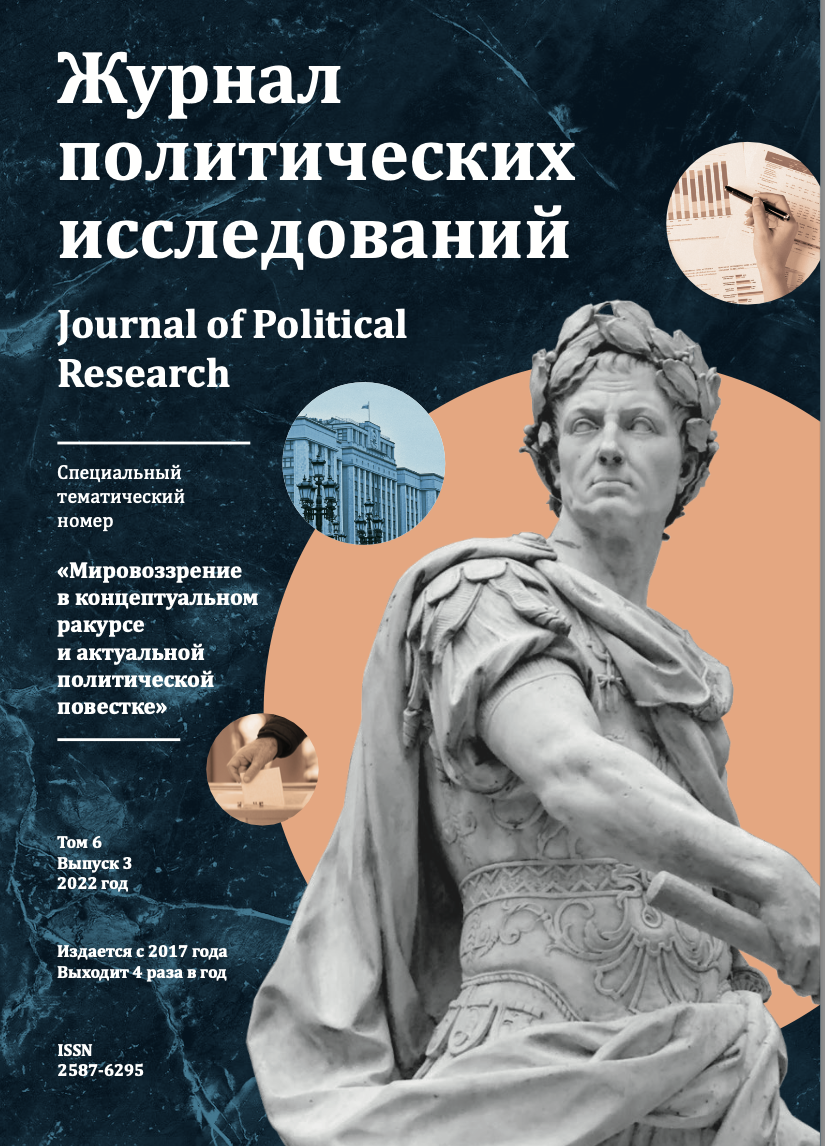Modern digital political philosophy occupies a special place among socio-humanitarianism in the chosen aspect of the study, as it is a new teaching and research area. This is due to the fact that its field includes the study of the creation and changes in the rules that regulate all spheres of social life, including theoretical and methodological support and practical everyday life. In the XXI century there has been an aggravation of contradictions between the intensive transformations taking place and the measured course of life. On the one hand, these are the values of changing the future, and on the other hand, the values of preserving the past, i.e., tradition and innovation. Modern man has enormous opportunities both to change the world and himself. The aim of the article is to explore the scientific-theoretical model of contemporary digital political philosophy by means of systematisation and analysis of the main approaches that reflect contemporary political-philosophical debates. The main method of research is historical and cultural analysis of contemporary problems in the field of artificial intelligence facing political philosophy. The viewpoint that digital political methodology for the science of the future will be of predominant importance is gradually being established in the world. The theoretical relevance of the study lies in the fact that it offers an example of digital methodological analysis, which can become a toolkit, with its help it is possible to develop in the future an interdisciplinary approach in the management of modern political problems in the field of artificial intelligence facing society. The practical relevance is that this study can be used in the educational process at the university level, as digital political philosophy will be able to supplement the academic level of students with a general understanding of what digitalisation in politics is and in what areas its application is necessary. It is concluded that digital political philosophy is the basis for the future revolution of neural networks, basic political science problems are performed by artificial intelligence much faster and better than real political actors, axiological agenda as well as multimedia content are also created unaided.
Philosophy of digitalisation; political philosophy; artificial intelligence; political digital assistant; political decision-making; language model; e-democracy
1. Alekseev G.V. Metateoriya i klassifikaciya cifrovyh prav i svobod cheloveka // Teoreticheskaya i prikladnaya yurisprudenciya. 2024. № 2. S. 24-36. DOI: https://doi.org/10.22394/2686-7834-2024-2-24-36; EDN: https://elibrary.ru/MFGQTD
2. Bodriyyar Zh. Prizrak tolpy. - M., Algoritm. 2018. - 303 s.
3. Bostrom N. Iskusstvennyy intellekt. Etapy. Ugrozy. Strategii. Moskva: «Mann, Ivanov i Ferber», 2016. - 404 s.
4. Verchenov L.N. Politicheskaya nauka: nacional'nye shkoly // Politicheskaya nauka. 2001. №3. S. 45-57
5. Vinokurov A.V., Evseeva N.V., Hudyakova M.A. Rossiyskaya vlast' i obschestvo: na poroge novogo obschestvennogo dogovora // Obschestvo: sociologiya, psihologiya, pedagogika. 2024. №1. S. 46-55. DOI: https://doi.org/10.24158/spp.2024.1.5; EDN: https://elibrary.ru/DLCJQE
6. Gadzhiev K.S. Liberal'no-konservativnyy konsensus v stranah Zapada // Vlast'. 2015. №1. S. 34-38 EDN: https://elibrary.ru/WAVRXB
7. Gasanov A.A. Industrial'noe nasledie v Rossii i za rubezhom: tradicii i innovacii mezhdisciplinarnogo napravleniya // Istoricheskiy zhurnal: nauchnye issledovaniya. 2024. №1. S. 48-60. DOI: https://doi.org/10.7256/2454-0609.2024.1.69571; EDN: https://elibrary.ru/QURKNV
8. Grinin L.E., Grinin A.L. Globalizm protiv amerikanizma. Chast' vtoraya. Globalizm i buduschee SShA i mira // Istoriya i sovremennost'. 2021. №3 (41). S. 3-54. EDN: https://elibrary.ru/FOYGFA
9. Evlampiev I.I., Shahova D.S. Russkie kritiki liberal'noy civilizacii i sovremennost' // Filosofskiy polilog. Mezhdunarodnyy centr izucheniya russkoy filosofii. 2022. №2 (12). S. 11-26.
10. Evstifeev R.V. Politicheskaya nauka pered vyzovami XXI veka: deglobalizaciya, dekolonizaciya, demistifikaciya // Novyy istoricheskiy vestnik. 2024. № 1. S. 108-135. DOI: https://doi.org/10.54770/20729286_2024_1_108; EDN: https://elibrary.ru/ECVXDR
11. Il'icheva M.V., Tomashevskiy K.O. Osobennosti informacionnoy povestki v molodezhnyh i novostnyh soobschestvah seti VKontakte vo vremya predvybornoy kompanii 2021-2022 gg. // Social'no-politicheskie nauki. 2022. T. 12. №5. S. 47-53.
12. Koval' E.A. Bol'shie dannye i bol'shie vyzovy social'nomu voobrazhaemomu // Social'nye normy i praktiki. 2023. №3. S. 54-64. DOI: https://doi.org/10.24412/2713-1033-2023-3-54-63; EDN: https://elibrary.ru/UGCFIB
13. Kurcveyl R. Evolyuciya razuma: kak razvitie iskusstvennogo intellekta izmenit buduschee civilizacii. - M.: Bombora, 2020. - 446 s.
14. Malinova O.Yu. Konstruirovanie smyslov: Issledovanie simvolicheskoy politiki v sovremennoy Rossii. - M.: RAN. INION, 2013. - 421 s. EDN: https://elibrary.ru/RVHRBV
15. Mal'cev K.G., Mal'ceva A.V. Cifrovizaciya i «cifrovoy fetishizm»: predvideniya v bytiyno-istoricheskom myshlenii M. Haydeggera // Chelovek. Kul'tura. Obrazovanie – Human. Culture. Education. 2020. № 4 (38). S. 46-58. DOI: https://doi.org/10.34130/2233-1277-2020-4-46; EDN: https://elibrary.ru/BDPHFG
16. Mihaylov I.F. Koncepcii vychisleniy v sovremennyh naukah o chelovecheskom poznanii // Filosofskie problemy informacionnyh tehnologiy i kiberprostranstva. №1(4). 2018. S. 4-18. DOI: https://doi.org/10.17726/philIT.2018.1.1; EDN: https://elibrary.ru/YAEVKX
17. Murodova N.S. Postsekulyarnoe buduschee v teoreticheskih izmeneniyah // Endless Light in Science. 2024. №1. S. 522-527.
18. Platon Gosudarstvo. – M., Akademicheskiy proekt, 2015. - 398 s.
19. Rans'er Zh. Nesoglasie: Politika i filosofiya = La mésentente: Politique et philosophie. - SPb.: Machina, 2013. - 192 s.
20. Sokolov A.V, Grebenko E.D. Sozdanie i razvitie cifrovyh ekosistem v Rossii kak sposoba kommunikacii vlasti i grazhdan // PolitBook. 2024. № 2. S. 6-23. DOI: https://doi.org/10.24412/2227-1538-2024-2-6-23; EDN: https://elibrary.ru/DBIFAS
21. Torochkova P.A. Social'nye seti kak element informacionnyh tehnologiy – novyy aktor mirovoy politiki // Vestnik RGGU: Politologiya. Istoriya. Mezhdunarodnye otnosheniya. 2014. №7 (129). S. 116-126. EDN: https://elibrary.ru/SIJYUP
22. Shtraus L. Vvedenie v politicheskuyu filosofiyu = Introduction to political philisophy: Introduction to political philisophy. - M., Praksis: Logos, 2000. - 363 s.
23. Fredkin E. An Introduction to Digital Philosophy [Elektronnyy resurs]. URL: https://doi.org/10.1023/A:1024443232206 (data obrascheniya: 25.07.2024).
24. Heidegger M. Einführung in die Metaphysik / Von Martin Heidegger, 2. Aufl. Tübingen: Niemeyer, 1958, 156 p.
25. Hofstadter Douglas R. Popular Culture and the Threat to Rational Inquiry // SCIENCE, 24 Jul 1998, Vol 281, Issue 5376, pp. 512-513. EDN: https://elibrary.ru/CVBVTZ




















